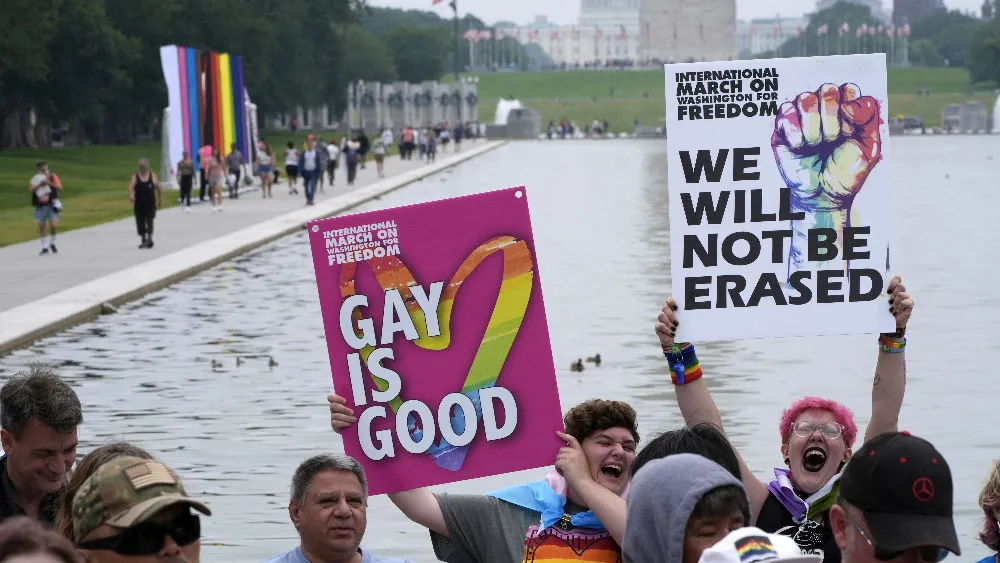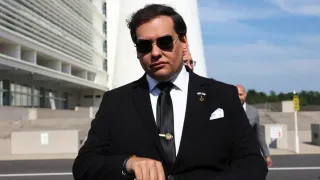April 29, 2014
Lawsuit an Unusual Challenge to Gay Marriage Ban
Jason St. Amand READ TIME: 3 MIN.
A coalition of clergy members is challenging North Carolina's constitutional ban on gay marriage with an unusual approach in a federal lawsuit: They say it violates their religious freedom.
The clergy members said in the lawsuit filed Monday that they'd like to perform same-sex marriage ceremonies in their congregations, but they can't because of the "unjust law."
Their attorney, Jake Sussman, says it's the only case to make First Amendment religious freedom claims among the more than 60 marriage equality cases pending in the nation's state and federal courts.
"North Carolina's marriage laws are a direct affront to freedom of religion," said the Rev. J. Bennett Guess, executive minister with the Cleveland-based United Church of Christ, which is a plaintiff in the lawsuit. "We feel that it is important that any person that comes into community life of a United Church of Christ congregation be afforded equal pastoral care and equal opportunity to religious services that clergy provide."
But in North Carolina, clergy are often faced with a troubling decision - "whether to provide those services or break the law," Guess said. "That's something no clergy member should be faced with."
Along with the United Church of Christ, which has more than 1 million parishioners, a dozen clergy members and same-sex couples who want to marry were listed as plaintiffs. The defendants included North Carolina Attorney General Roy Cooper and several county district attorneys as well as five registers of deeds.
Noelle Talley, a spokeswoman with the attorney general's office, said officials there hadn't seen the lawsuit yet.
Wake County Register of Deeds Laura Riddick said she was shocked to be named as a defendant. Her office handles marriage licenses.
"It's ridiculous for any registry to be sued over same-gender marriage, which is a matter of state law, not county policy. Only the legislature or the courts can change the law. Our job as county administrators is to apply the law as it is, just as we will apply the law if it changes. Suing us misleads the public, wastes county taxpayer dollars and creates unnecessary conflict," she said.
This isn't the first legal challenge to North Carolina's law ban on same-sex marriage, which was approved by voters in 2012.
The American Civil Liberties Union earlier this month launched a new legal assault on the state's ban on recognizing same-sex marriage, urging a federal judge to quickly negate it to help children and gay couples suffering from urgent health problems. The civil rights group said it was seeking to speed up a decision in a lawsuit filed in 2012 by citing the urgent health needs of a child who suffers from cerebral palsy who was adopted by one of the lesbian couples involved in the case.
The ACLU also filed a new lawsuit on behalf of three other lesbian couples struggling with health conditions made more difficult because they lack legal recognition of their marriages performed in other states, said ACLU staff attorney Elizabeth Gill.
The ACLU and the same-sex couples they represent argue a judge should act quickly to suspend North Carolina's marriage ban because they are suffering immediate and irreparable harm.
The U.S. Supreme Court ruled last year that the federal government must recognize marriages of same-sex couples.
Seventeen states allow gay marriage, and federal judges have struck down bans in Michigan, Utah, Texas, Oklahoma and Virginia.
"This lawsuit introduces a First Amendment claim that the marriage ban in North Carolina violates the right to the free exercise of religious beliefs by denominations, clergy and congregants who believe that same-sex marriages are theologically valid and want to perform marriage ceremonies," Sussman said.
But NC Values Coalition executive director Tami Fitzgerald, who helped lead a coalition of Christian and conservative groups supporting the state's 2012 constitutional amendment, said the lawsuit is an attempt to void the will of voters who backed traditional marriage. Six in 10 voters backed changing North Carolina's constitution.
"This is sadly, and predictably, the 'lawsuit of the week' filed by those who want to impose same-sex marriage on North Carolina," Fitzgerald said. "Moreover, it's both ironic and sad that an entire religious denomination and its clergy who purport holding to Christian teachings on marriage would look to the courts to justify their errant beliefs."







